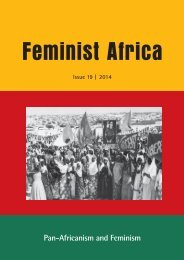ziI7w
ziI7w
ziI7w
Create successful ePaper yourself
Turn your PDF publications into a flip-book with our unique Google optimized e-Paper software.
NARRATIVE PROGRESS REPORTS<br />
Most foundations require a written progress report at<br />
the end or near the end of the grant period. If you have<br />
a multi-year grant, an interim and final report may be<br />
required. Reporting deadlines are usually detailed in<br />
the grant award agreement. If reporting deadlines are<br />
not included in the grant agreement, ask the program<br />
officer at the beginning of the grant period so you aren’t<br />
surprised later.<br />
Some funders ask for this report after the grant is over<br />
(that’s why it’s important to keep the funder informed<br />
of your work throughout the year and not to wait until<br />
the final report), while others want to see it before they<br />
invite you to submit a proposal for renewed funding. A<br />
satisfactory report may be a condition of eligibility for a<br />
future grant, so it is important to write a good report.<br />
Be sure to follow the foundation’s guidelines for reports.<br />
Make sure you have them well in advance so you have<br />
plenty of time to prepare.<br />
Reports usually have at least two parts: the financial<br />
report, which tracks your spending against the original<br />
proposal budget, and the narrative report, which details<br />
your progress toward the grant’s goals. Depending on<br />
the funder, there may be additional requirements, such<br />
as specialized charts or appendices. Some foundations’<br />
guidelines include strict page limits, font size, and margin<br />
requirements. Be sure to adhere to any requirements given.<br />
Reports can be a good opportunity to share publications<br />
or other materials you’ve created, press coverage you’ve<br />
received, etc. But first check the funder’s guidelines: some<br />
funders say explicitly not to send anything extra, but to<br />
include only the information they request in your report. If<br />
you keep these funders updated throughout the year, you<br />
can send this extra information and examples of your work<br />
during the grant period instead of with the final report.<br />
COMMON ELEMENTS OF REPORTS<br />
If you are aware of the reporting guidelines, you can<br />
collect information throughout the grant period to help<br />
you answer the questions asked in the report template.<br />
You can also interview the relevant program staff before<br />
you write the report. Common elements and questions to<br />
consider for a report include:<br />
A cover sheet or cover letter, which includes the<br />
basic information about your grant such as title,<br />
grant number, amount of funding, grant period,<br />
and contact information for the organization, as<br />
well as the primary person responsible for report<br />
An executive summary, which provides a brief<br />
overview of the contents of the report (this can<br />
be one paragraph or up to one page in length,<br />
depending on the size of the report)<br />
A report narrative that answers the following<br />
questions:<br />
◆◆<br />
What progress have you made toward your<br />
project’s goals and objectives?<br />
◆◆<br />
What were your biggest achievements/outcomes<br />
during the grant period?<br />
◆◆<br />
What activities did you complete during the<br />
grant period?<br />
◆◆<br />
Did you conduct activities that were not in the<br />
original proposal? If so, what were they and why?<br />
◆◆<br />
Are there any activities you did not complete?<br />
If not, why? Do you have plans to complete<br />
them after the grant period? If so, how will your<br />
organization be able to do so? (i.e. do you have<br />
other funding to continue them?)<br />
◆◆<br />
What challenges did you face and how did<br />
you address them? Foundations want to know<br />
what obstacles you’ve encountered and how you<br />
overcame them.<br />
◆◆<br />
Have there been any major changes to your<br />
organization in the past year? If so, what were<br />
they and how did you respond to them?<br />
◆◆<br />
Have there been any major changes to the<br />
bigger context (the community, the social or<br />
political environment of the country, etc.) that<br />
affected your work? How did you respond to<br />
these changes? Foundations often want to learn<br />
from their grantees about what is happening<br />
in their countries and communities as well as<br />
learning about the project.<br />
◆◆<br />
What was the impact of your project?<br />
◆◆<br />
What were the lessons learned from this project/<br />
grant? What worked and what didn’t? Will you<br />
share these lessons with others? If so, how?<br />
◆◆<br />
How has this project affected your<br />
organizations’ future planning and activities?<br />
◆ ◆ Did you receive additional financial/other<br />
support in implementing this project? If so,<br />
36




